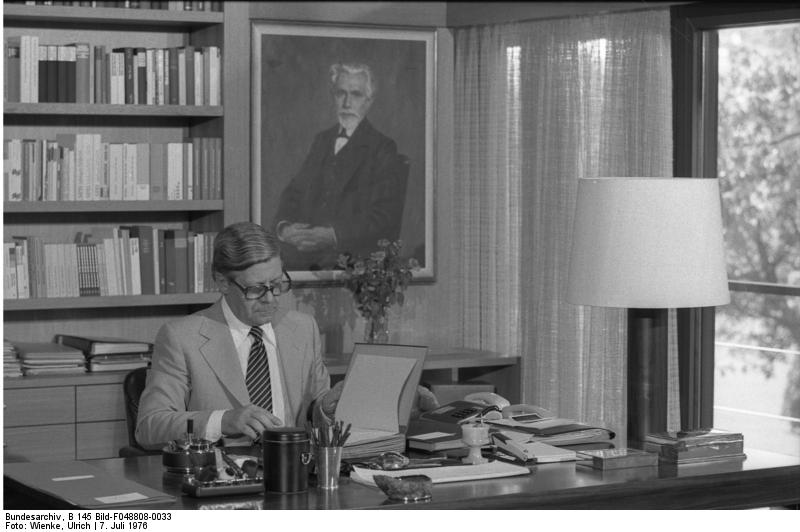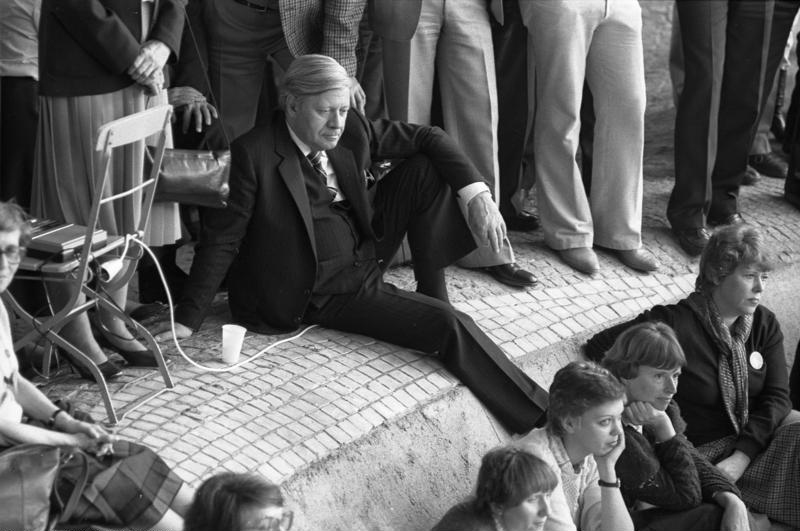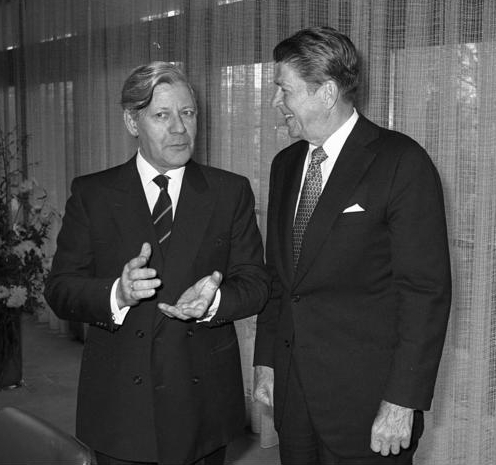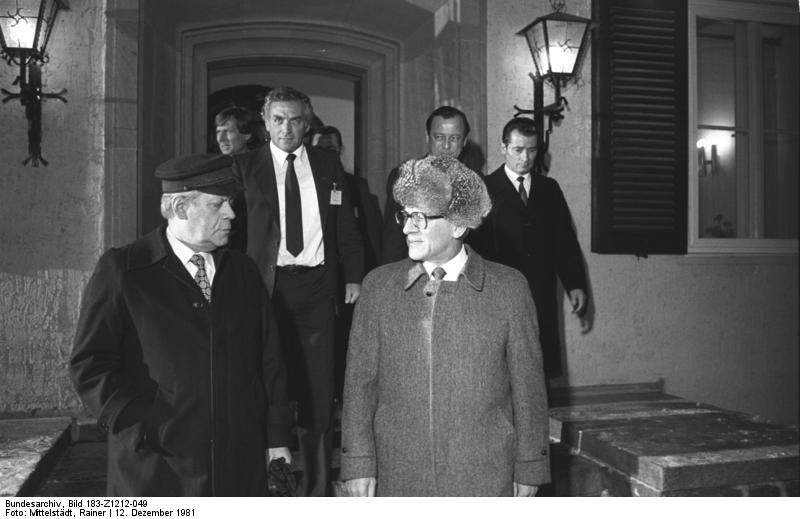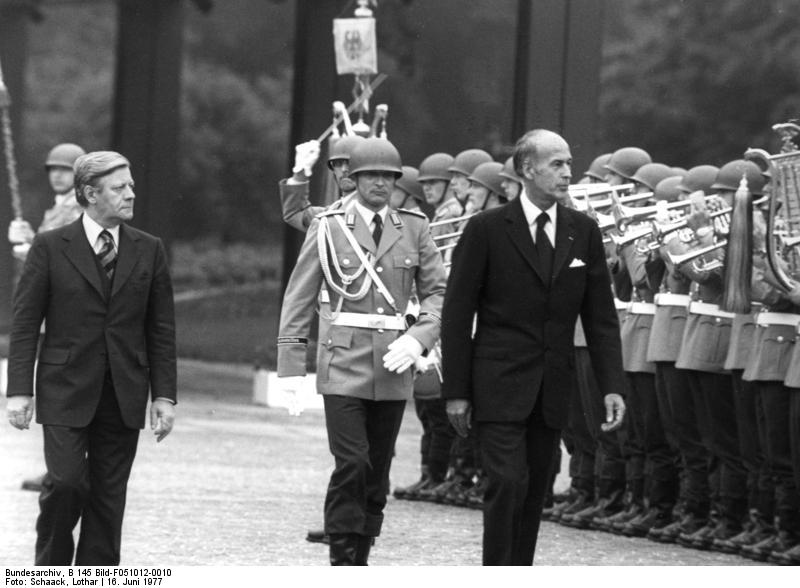<Back to Index>
- Chancellor of Germany Helmut Heinrich Waldemar Schmidt, 1918
PAGE SPONSOR
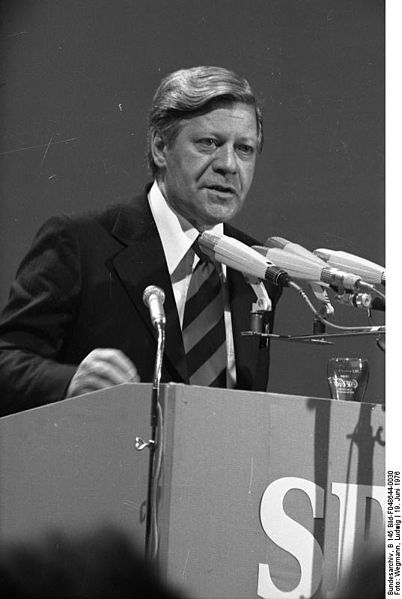
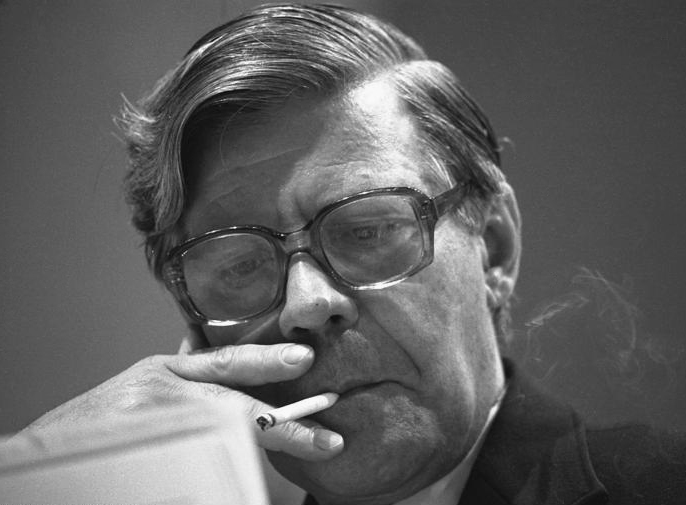
Helmut Heinrich Waldemar Schmidt (23 December 1918 - 10 November 2015) was a German Social Democratic politician who served as Chancellor of West Germany from 1974 to 1982. Prior to becoming chancellor, he had served as Minister of Defense and Minister of Finance. He had also served briefly as Minister of Economics and as acting Foreign Minister. He was the oldest surviving German Chancellor and the last surviving person to have been solely Chancellor of West Germany (Helmut Kohl was Chancellor of both West Germany and reunified Germany). He was also the oldest living Federal German Minister, after the death of his Interior Minister Werner Maihofer.
Helmut Schmidt was born in Hamburg, as son of two teachers. He studied at Hamburg Lichtwark School, graduating in 1937. Schmidt's father was the illegitimate son of a German Jewish businessman, although this was kept secret in the family. This was confirmed publicly by Helmut Schmidt in 1984, after Valéry Giscard d'Estaing had, apparently with Schmidt's assent, revealed the fact to journalists. Schmidt himself was a non - practicing Lutheran.
On 27 June 1942, he married his childhood sweetheart Hannelore "Loki" Glaser (3 March 1919 – 21 October 2010). They had two children: Helmut Walter (26 June 1944 – February 1945, died of meningitis), and Susanne (b. 1947), who worked in London for Bloomberg Television. Schmidt completed his education in Hamburg after the war, studying economics and political science. He graduated in 1949.
He was conscripted into military service and began serving with an anti - aircraft battery at Vegesack near Bremen during World War II. After brief service on the Eastern Front, including the seige of Leningrad, he returned to Germany in 1942 to work as a trainer and advisor at the Reichsluftfahrtministerium. He attended the People's Court, presided over by Roland Freisler, as an army spectator at some of the show trials for officers involved in the July 20 plot where an unsuccessful attempt was made to assassinate Hitler at Rastenburg and was disgusted by the whole process. Toward the end of the war, from December 1944 onward, he served as an Oberleutnant in the Flakartillery on the Western Front. He was captured by the British in April 1945 on Lüneburg Heath and was a prisoner of war until August. During his service in World War II Schmidt was awarded the Iron Cross.
Schmidt joined the Social Democratic Party (SPD) in 1946, and from 1947 to 1948 was leader of the Sozialistischer Deutscher Studentenbund, the student organization of the SPD.
Upon leaving the university, he worked for the government of the city - state of Hamburg, working in the department of economic policy. Beginning in 1952, under Karl Schiller, he was a senior figure in the Behörde für Wirtschaft und Verkehr (the Hamburg State Ministry for Economy and Transport).
He was elected to the Bundestag in 1953, and in 1957 he became member of the SPD parliamentary party executive. A vocal critic of conservative government policy, his outspoken rhetoric in parliament earned him the nickname "Schmidt - Schnauze". In 1958, he joined the national board of the SPD (Bundesvorstand) and campaigned against nuclear weapons and the equipping of the Bundeswehr with such devices. In 1958, he gave up his seat in parliament to concentrate on his tasks in Hamburg.
From 27 February 1958, to 29 November 1961, he was a Member of the European Parliament, which was not directly elected at the time.
The government of the city - state of Hamburg is known as the Senate of Hamburg, and from 1961 to 1965 Schmidt was the Innensenator, that is Minister of the Interior. He gained the reputation as a Macher (doer) – someone who gets things done regardless of obstacles – by his effective management during the emergency caused by the 1962 flood. Schmidt used all means at his disposal to alleviate the situation, even when that meant overstepping his legal authority, including federal police and army units (ignoring the German constitution's prohibition on using the army for "internal affairs"; a clause excluding disasters was not added until 1968). Describing his actions, Schmidt said, "I wasn't put in charge of these units - I took charge of them!"
This characteristic was coupled with a pragmatic attitude and opposition to political idealism, including those of student protests, best symbolized by his well known remark that "People who have visions should go see a doctor."
In 1965, he was re-elected to the Bundestag. In 1967, after the formation of the Grand Coalition between SPD and CDU, he became chairman of the Social Democrat parliamentary party, a post he held until the elections of 1969.
In 1967, he was elected deputy party chairman.
In October 1969, he entered the government of Willy Brandt as defense minister. During his term in office the military conscription time was reduced from 18 to 15 months. Additionally, Schmidt decided to introduce the Bundeswehr universities in Hamburg and Munich to broaden the academic education of the German officer corps. In July 1972, he succeeded Karl Schiller as Minister for Economics and Finances, but in November 1972, he relinquished the Economics department, which was again made a separate ministry. Schmidt remained Minister of Finances until May 1974.
From 1968 to 1984, Schmidt was deputy chairman of the SPD (unlike Willy Brandt and Gerhard Schröder, he was never actually chairman of the party).
He became Chancellor of West Germany on 16 May 1974, after Brandt's resignation in the wake of an espionage scandal. The worldwide economic recession was the main concern of his administration, and Schmidt took a tough and disciplined line. During his term, Germany had to cope with the oil crisis of the 1970s; according to some judgments, Germany managed better than most of the industrial states. Schmidt was also active in improving relations with France. Together with the French President Valéry Giscard d'Estaing, he was one of the fathers of the world economic summits, the first of which assembled in 1975.
In 1975, he was a signatory of the Helsinki Final Act to create the Conference for Security and Co-operation in Europe, the precursor of today's OSCE.
He remained chancellor after the 1976 elections in coalition with the FDP.
He adopted a tough, uncompromising line with the indigenous Red Army Faction terrorists. He authorized the GSG 9 anti - terrorist unit to end the Palestinian terrorist hijacking of the Lufthansa aircraft Landshut, undertaken to secure the release of RAF leaders imprisoned in Stuttgart, after it landed in Mogadishu by assaulting the aircraft during the German Autumn of 1977. Three of the four terrorist were killed during the hostage rescue.
Concerned about the Soviet invasion of Afghanistan and the Soviet superiority regarding missiles in Central Europe, Schmidt issued proposals resulting in the NATO Double - Track Decision concerning the deployment of medium range nuclear missiles in Western Europe should the Soviets not disarm. He was re-elected as chancellor in November 1980. In October 1981, Schmidt was fitted with a cardiac pacemaker.
At the beginning of his period as Bundeskanzler, Schmidt was a proponent of Keynesian economics, and pursued expansionary monetary and fiscal policies during his time as chancellor. Between 1979 and 1982, the Schmidt Administration pursued such policies in an effort to reduce unemployment. These were moderately successful, as the fiscal measures introduced after 1977, with reductions in income and wealth taxes and an increase in the medium term public investment program, was estimated to have created 160,000 additional jobs in 1978 - 79, or 300,000 if additional public sector employment was included in the figure). The small fall the unemployment rate, however, was achieved at the cost of a larger budget deficit (which rose from 31.2 billion DM to 75.7 billion DM in 1981), brought about by fiscal expansion).
During the Seventies West Germany was able to weather the global financial storm far better than almost all the other developed countries, with unemployment and inflation kept at comparatively low levels. During the 1976 election campaign, the SDP - FDP coalition was able to win the battle of statistics, whether the figures related to employee’s incomes, strikes, unemployment, growth, or public sector debts. Among other social improvements, retirement pensions had been doubled between 1969 and 1976, and unemployment pay increased to 68% of previous earnings.
By the end of his term, however, Schmidt had turned away from deficit spending, due to a deteriorating economic situation, and a number of welfare cuts were carried out, including smaller increases in child benefits and higher unemployment and health contributions. Large sections of the SPD increasingly opposed his security policy while most of the FDP politicians strongly supported that policy; while representatives of the left wing of the Social Democratic Party opposed reduction of the state expenditures, the FDP began proposing a monetarist economic policy. In February 1982, Schmidt won a Motion of Confidence, however on 17 September 1982, the coalition broke apart, with the four FDP ministers leaving his cabinet. Schmidt continued to head a minority government composed only of SPD members, while the FDP negotiated a coalition with the CDU / CSU. During this time Schmidt also headed the Ministry of Foreign Affairs. On 1 October 1982, parliament approved of a Vote of No Confidence and elected the CDU chairman Helmut Kohl as the new Chancellor. This was the only time in the history of the Federal Republic that a Chancellor was ousted from office in this way.
Although Schmidt did not feel that he was in a position to substantially extend the social reforms of the Brandt Administration, due to the economic problems he encountered during his time as chancellor, a wide range of reforms were nevertheless carried out under his administration. These included:
- The introduction of employment creation schemes to help young workers.
- Major improvements in welfare provision for the elderly.
- The introduction of special benefits to compensate for wages not paid as a result of bankruptcy for a maximum of up three months (July 1974).
- The Training Opportunities Act (1976) which, over a four year period, helped to increase the number of vocational training places from 450,000 to 630,000 a year.
- The replacement of tax allowances by child benefit as well as payment for the first child (1975).
- Increases in income limits for housing allowances together with housing allowance rates.
- A new declaration of social rights (1976).
- A Sex Discrimination Act (1977).
- The introduction of a "parity" system (although in a weakened form) on the supervisory boards of all companies employing over 2,000 workers, a reform which West German trade unions had long fought for. This law improved employee representation on the supervisory boards of companies outside the steel and coal industries. The main provision of this new piece of legislation was that in the 650 major companies that accounted for 70% of West Germany’s output, employee representation on the supervisory boards rose from one - third to one - half.
- The 1976 Act for the Promotion of Urban Development and the 1977 Housing Modernization Act, which (together with the 1971 Act for the Promotion of Urban Development passed by the Brandt Administration) by the end of the Seventies had enabled most West German cities to introduce programs aimed at renovating their prewar residential areas.
- Improvements in family allowances, with monthly subsidies for children increased by over 100% (1975).
- The introduction of additional tax reforms that lowered the tax burden on low income households, and which played an important role “in preempting a real decline in the income and purchasing power of workers”.
- The introduction of social policy legislation in the late seventies which increased family allowances (though by a smaller amount than in 1974) and maternity leave benefits.
- The passage of a reformed food law, which aimed to safeguard consumers from physical harm (June 1974).
- A tax relief act, which reduced income taxes and provided additional tax benefits for housing allowances.
- The introduction of several policy changes between 1976 and 1982, such as tax credits and family allowances, which compensated unions for wage restraint and “guaranteed the maintenance of a constant income level for employed persons and their families”.
- A substantial increase in the child allowance (1979).
- The introduction of a special tax credit (1978) in cases of particular financial burden due to children.
- The launching of an experimental retraining program on the shop floor (lasting from 1979 to 1981), which benefited 45,680 people.
- The Law to Improve Occupational Old Age Pensions (1974), which extended coverage of occupational pensions whilst also “coordinating them more closely with state pensions and setting minimum standards as regards benefit levels and the preservation of pension rights.” By 1976, as a result of this legislation, 65% of private sector employees were covered by occupational schemes and over two - thirds of these workers were eligible for benefits equal to more than 15% of their earnings at retirement. This legislation also acquired that entitlements to occupational pensions must not expire after leaving a form and that occupational pensions must not be reduced as a result of receipt of benefits under the public insurance system.
- Improvements in invalidity and old age pension provision for the unemployed, who (from 1977 onward) were technically insured free of charge under the old-age pension and invalidity scheme. Previously, there had only existed partial and restricted coverage for the unemployed.
- The Social Insurance Law for the Handicapped (1975) which extended compulsory coverage to handicapped persons working in special establishments for the handicapped (medical benefits and cash benefits to replace earnings from work).
- A reform of naming for partners after marriage (1976).
- A reform of marriage law, which eliminated “moral guilt” as a criterion for alimony payment obligations (1976).
- Increases in child benefits, which rose on a regular basis (particularly for families with more than one child) for most of the years that the Schmidt Administration was in office.
- The introduction of a provisional law (1976) to boost the number of apprentices, which reduced the numbers of young people out of work.
- The First Marriage Reform Law (1976), which stated that pension entitlements acquired during marriage must be shared with the economically weaker spouse following divorce.
- The Artists’ Social insurance Law (1981), which introduced compulsory insurance for artists below a certain income limit.
- A prison reform (1977) which limited sentences in all but the gravest cases to 15 years, while proclaiming rehabilitation to be the objective of incarceration.
- Increases in pensions, which went up in numerical terms by 11.1% (1975), 11.0% (1976), 9.9% (1977), 4.5% (1979), 4% (1980), 4% (1981), and 5.8% (1982). Adjusted for changes in the annual price index, pensions went up in real terms by 5.1% (1975), 6.7% (1976), 6.2% (1977), 0.4% (1979), and 0.6% (1982). However, the rate of pension was not changed in 1978 (even though prices increased by 2.7%), and in 1980 and 1981 the real value of pensions fell by 1.5% and 2.3%, respectively.
- The Introductory Tax Reform Law (1974), which increased bad weather payments, part time workers’ benefits and insurance benefits to 68% of net wages, fixed special benefits during vocational training at 90% of net earnings, increased assistance benefits to 58% of net earnings, and abolished special family benefits “in favor of the inclusion of the unemployed under general child allowance scheme”.
- The Students’ Sickness Insurance Law (1975) which extended compulsory coverage to students (medical benefits only).
- The Maintenance Security Law (1979), which introduced public advance payments for single parents “not in receipt of maintenance payments from the liable parent.” These benefits were made payable up to 36 months, and private claims against a parent not meeting a maintenance liability were taken over by the state.
- The extension of entitlement to educational allowances to cover all tenth grade pupils in vocational education (1978).
- The adoption of the European directive on equal treatment for women in paid employment (1979).
- The passage of the Detergents Law (1975) and the Effluency Levies Act (1978) to encourage environmental protection.
- The introduction of four months paid parental leave for working mothers (1979).
- The introduction of a law which enabled married women to enter employment without the permission of their husbands (1977).
- The strengthening of the legal status of people from other countries by facilitating the acquisition of unlimited residence permits (1978).
- An amendment to the legal code for residency permits (1978), which granted foreign residents the right to unlimited residence permits after five years of continuous residency. The amendment also stated that legal residents would be eligible for a residence entitlement after eight years if certain conditions were met, such as language fluency.
- A reduction in poverty between 1978 and 1982.
In 1982, along with his friend Gerald Ford, he co-founded the annual AEI World Forum.
In 1983, he joined the nationwide weekly Die Zeit newspaper as co-publisher. In 1985, he became Managing Director. With Takeo Fukuda he founded the Inter Action Councils in 1983. He retired from the Bundestag in 1986. In December 1986, he was one of the founders of the committee supporting the EMU and the creation of the European Central Bank.
Contrary to the line of his party, Helmut Schmidt was a determined opponent of Turkey's entry into the EU. He also opposed phasing out nuclear energy, something that the Red - Green coalition of Gerhard Schröder supported. Further, Schmidt regarded the climate debate “hysteric” and the IPCC reports skeptical. About the Internet, Schmidt said, he perceived it as "threatening".
Schmidt is author of numerous books on his political life, on foreign policy and political ethics. He remained one the most renowned political publicists in Germany.
In later years, Schmidt had been afflicted with increasing deafness.
Schmidt numbered the assassinated Egyptian president Anwar as-Sadat among his particular friends from the world of politics, and sustained his friendship with ex-president Valéry Giscard d'Estaing of France. His circle also included former U.S. Secretary of State Henry Kissinger who is on record as stating that he wished to predecease Helmut Schmidt, because he would not wish to live in a world without Schmidt.
He was also good friends with Canadian Prime Minister Pierre Trudeau. In 2011 Schmidt, accompanied by Jean Chrétien and Tom Axworthy, made a pilgrimage to the Trudeau family vault in St - Rémi - de - Napierville Cemetery.
- He was a great admirer of the philosopher Karl Popper, and contributed a foreword to the 1982 Festschrift in Popper's honor.
- The University of Germany's Federal Armed Forces in Hamburg was renamed Helmut Schmidt University - University of the Federal Armed Forces Hamburg in 2003 in honor of the politician who – as minister of defense – had introduced obligatory academic education for German career officers.
- Born and raised in Hamburg, Schmidt was regarded in Germany as an embodiment of hanseatic values, according to which he never accepted a medal or an order of merit (not even the Federal Republic's Federal Cross of Merit).
- Schmidt was also a talented pianist, and recorded piano concertos of both Mozart and Bach with the well known German pianist and conductor, Christoph Eschenbach.
- Schmidt (as was his late wife) was a smoker. He was well known for lighting up cigarettes on TV interviews and talk shows. In January 2008, German police launched an inquiry after Schmidt was reported by an anti - smoking initiative for defying the recently introduced smoking ban. The initiative claimed that Helmut Schmidt had been flagrantly ignoring laws "for decades". Despite pictures in the press, the case was subsequently dropped after the public prosecution service decided that Schmidt's actions had not been a threat to public health.
- On April 6, 2010, with a lifespan of 33 342 days he surpassed Konrad Adenauer in terms of longevity and became the oldest former chancellor in German history.
- His wife, Loki Schmidt, died on 21 October 2010.
- At the beginning of August 2012, Schmidt gave an interview on German television where he revealed that at 93 years of age he had fallen in love again. His new fiancée was Ruth Loah, 79, a long time associate of his.
